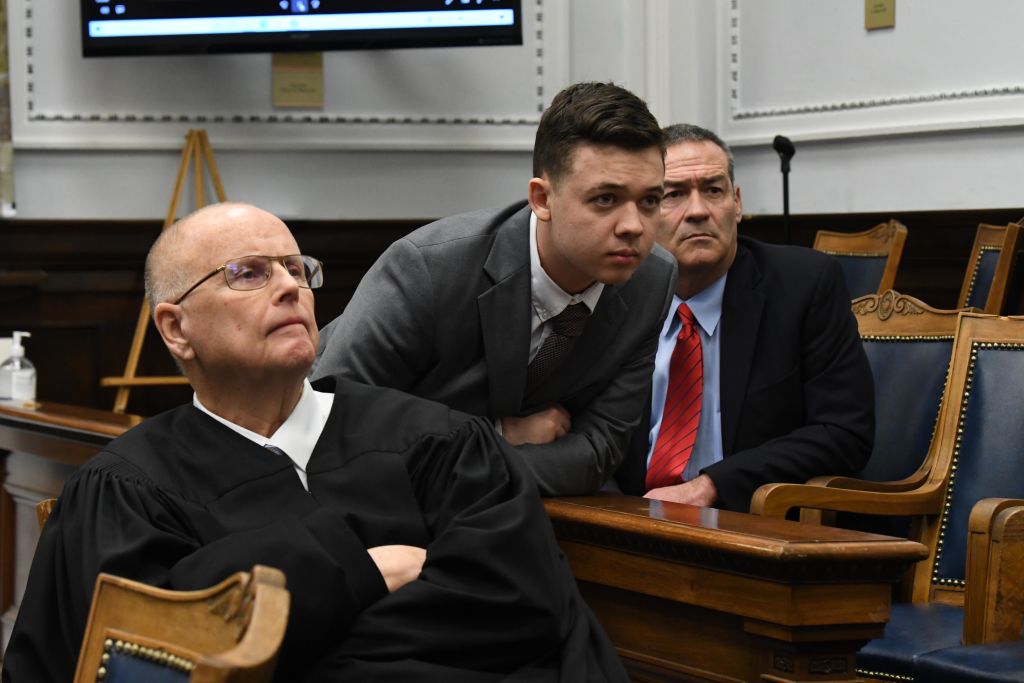Kenosha Circuit Court Judge Bruce Schroeder on Monday dismissed one of the six charges against Kyle Rittenhouse, according to CNN.
The judge dismissed what was listed as count six on the indictment against Rittenhouse: a misdemeanor charge for possession of a dangerous weapon by a person under 18.
KENOSHA, Wis. (AP) — Judge at Kyle Rittenhouse trial dismisses charge of possession of dangerous weapon.
— darlene superville (@dsupervilleap) November 15, 2021
The Associated Press explained the charge came about because Rittenhouse was armed with an AR-style rifle, and he was 17 at the time of the Kenosha riots.
Wisconsin law prohibits those under 18 from possessing firearms except for use in hunting. The charge is a misdemeanor punishable by up to nine months behind bars.
Rittenhouse remains charged with two counts of first-degree homicide, the most serious charges against him. He also faces two counts of first-degree endangering safety through the use of a dangerous weapon and one count of attempted first-degree homicide.
I said over a year ago that the charge was specious, because the law as written could reasonably be read to allow what Rittenhouse did, in possessing a rifle, as a 17yo. At best, he was “guilty” of a vague law, which should make the law unenforceable.https://t.co/pBSvi3oQm4
— Pudge (@pudgenet) November 15, 2021
On Friday, Schroeder had commented about the charge, according to Fox News.
“I have been wrestling with this statute with, I’d hate to count the hours I’ve put into it, I’m still trying to figure out what it says, what’s prohibited. I have a legal education,” he said.
He said he doubted what he termed an “ordinary citizen” could understand the law.
Closing arguments in the trial of Kyle Rittenhouse, who shot three men during unrest in Kenosha, Wisconsin last summer will be delivered Monday, as the city braces for potential violent reactions to the verdict.#CGTNAmerica https://t.co/U9clOhWpZV
— CGTN (@CGTNOfficial) November 15, 2021
Closing arguments in the trial were to take place Monday. Jury deliberations will begin once the closing arguments are concluded.
Rittenhouse claims that the shootings that took place against the backdrop of the Kenosha riots in August 2021 were in self-defense, according to CBS.
On Monday, Schroeder tried to explain the law to the jurors, as noted by attorney Andrew Branca, who was live-tweeting the trial.
Judge: Consider whether defendant provoked attack, if unlawful act provokes, cannot claim self-defense; but if provoked attack deadly in nature can self-defense if exhaust every possibility of not having to use deadly defensive force.
— Law of Self Defense (@LawSelfDefense) November 15, 2021
Judge: Count 1, reckless homicide of Rosenbaum, with utter disregard for human life. [That’s first-degree reckless homicide; if no utter disregard, can still be second-degree.]
Caused death of another, conduct substantial factor, conduct was criminally reckless.
— Law of Self Defense (@LawSelfDefense) November 15, 2021
Judge: Reckless endangerment, state must prove:
1. Defendant endangered other
2.Risk of death unreasonable and substantial
3. Defendant aware of risk of death— Law of Self Defense (@LawSelfDefense) November 15, 2021
Rittenhouse and his attorneys claim he was acting in self-defense when he shot and killed Joseph Rosenbaum and Anthony Huber. “I didn’t do anything wrong, I was defending myself,” Rittenhouse has testified.
Prosecutors have tried to paint Rittenhouse as coming to Kenosha with violence on his mind and as the aggressor on the streets that night.
A charge against Rittenhouse of being out after curfew was dismissed earlier by Schroeder.
This article appeared originally on The Western Journal.

























 Continue with Google
Continue with Google